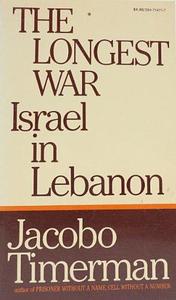You need to sign in or sign up before continuing.
Take a photo of a barcode or cover
reflective
Whew. This book contains a unique historical perspective on Israel’s war of aggression and invasion of Lebanon in 1982, but boy is there a lot to unpack. The author is a Zionist and his racism towards Palestinians is evident throughout, yet it seems that he is unwilling to recognize his prejudice based on how casually he condescends towards Palestinians while giving them ‘advice’ on how to ‘democratically resist’ Israeli occupation.
A quote, to illustrate my point: “The historical backwardness of the people’s of the region, particularly that of the Palestinians, obliges us to deal with the Arab countries from a moral standpoint”. 113
Obvious racism aside, the author does criticize the Israeli government under Begin as undemocratic and extremist. He calls out the propaganda machine and explains how war puts Jewish people at risk (physically, spiritually, politically). He concedes that Palestinians deserve their own state but stops short of condemning Zionist settler-colonialism. I felt many times that surely he was getting there, but instead he directs his critiques towards military actions and individual politicians, remaining steadfast in his Zionist belief that Israel is uniquely, morally complex. It is baffling, but it is for those exact reasons that it is so fascinating to read older books from the region. With the hindsight they provide, one can see exactly how we have gotten to this current moment in history.
“Many of us, surely a majority of Israelis, want the Palestinians to vanish physically from this region, want them banished from our presence. Others dream of the possibility of a sudden miracle that will settle them happily and forever somewhere far from us. As if Palestinians could be rendered docile by a vanishing act, or happy through an act of magic”.
“I have little faith in Israel’s democratic opposition. I fear that the Israeli discipline which totally dominates the subconscious of all of us will result in an investigation that, in effect, protects the criminals from the punishment they deserve, and that the Israeli people will suffer an overwhelming loss of respect and moral standing in the eyes of the world...I fear that in our collective subconscious we may not be wholly repelled by the possibility of a Palestinian genocide”
The author calls for dignity, honor, and independence for Palestinians. He asks for the Jewish Diaspora to pass judgment upon on the war criminals and to help “cure Israel of nationalism and intolerance”.
It’s hard to give a rating, but I could probably write an entire essay on this book, so safe to say it was worth the read.
A personal reflection in journal form that offers insight into a specific historical event in Israel's history but also opens a conversation on a significant paradigm shift in Israel. That shift being from defender to aggressor. This shift was very disturbing and it seems to the point of being heart wrenching for Timerman as he watched Israel's leadership take their nation down a violent and dangerous path.
Timerman voices concern for the authoritarian behaviour of Israel's leadership. Timerman's own personal circumstances forced him to experience an authoritarian regime first hand. Timerman devoted many years of his journalistic work to exposing the violence and corruption of the military regime in Argentina during the "Dirty War". Timerman highlights the similar behaviours and tendencies now being exhibited by Israel's government.
The book is small in size but a dense and deeply personal examination of a country moving dangerously close to authoritarianism and militarism. Timerman's own arrest, torture and imprisonment in Argentina gave him very personal and unique insights into the damage he was convinced was being caused by Israel's 1982 invasion of Lebanon. Given current events in Gaza (April 2018) one can't help but view Timerman's "The Longest War" as prophetic.
Timerman voices concern for the authoritarian behaviour of Israel's leadership. Timerman's own personal circumstances forced him to experience an authoritarian regime first hand. Timerman devoted many years of his journalistic work to exposing the violence and corruption of the military regime in Argentina during the "Dirty War". Timerman highlights the similar behaviours and tendencies now being exhibited by Israel's government.
The book is small in size but a dense and deeply personal examination of a country moving dangerously close to authoritarianism and militarism. Timerman's own arrest, torture and imprisonment in Argentina gave him very personal and unique insights into the damage he was convinced was being caused by Israel's 1982 invasion of Lebanon. Given current events in Gaza (April 2018) one can't help but view Timerman's "The Longest War" as prophetic.

